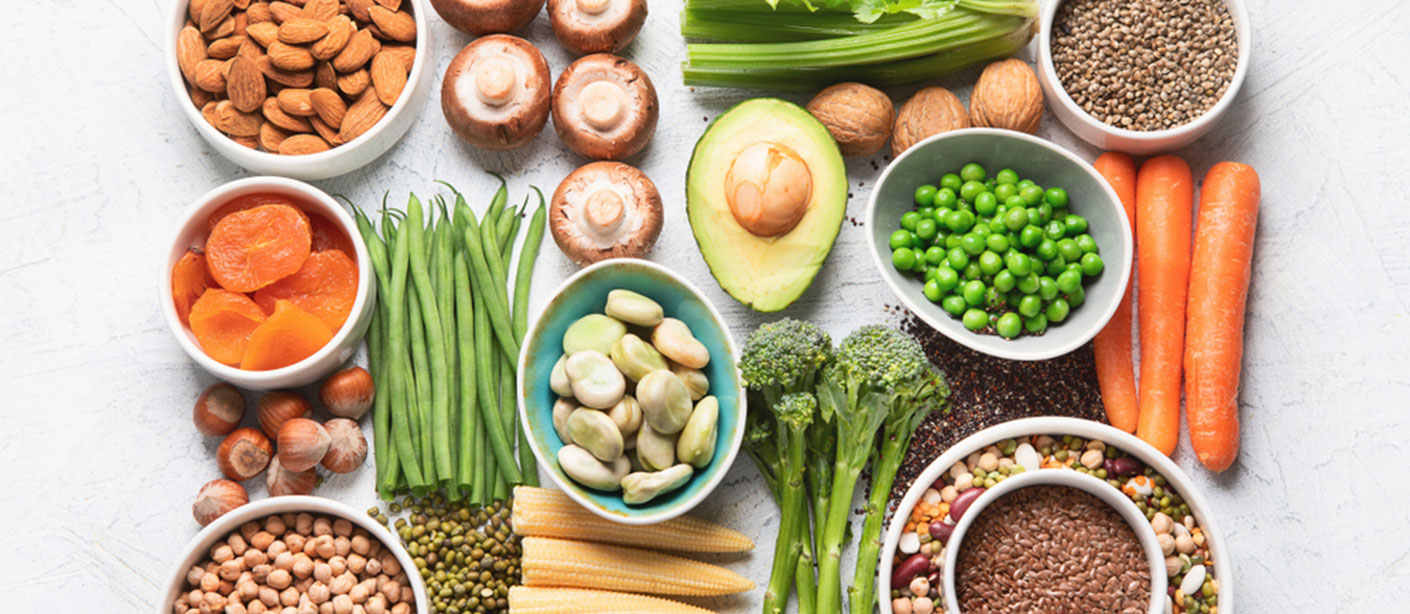A new randomized clinical trial, comparing vegan with omnivorous diets, is buzzing among the health community right now. The study observed 22 healthy, adult, identical twin pairs. One twin consumed a vegan diet, and the other twin consumed a healthy omnivorous diet. After 8 weeks, the study found the twins who consumed the vegan diet experienced decreases in LDL-cholesterol, insulin and weight, compared to the twins who consumed the omnivorous diet. While promising at first glance, there are several limitations to this study that should be considered before adopting a plant-based diet.
For starters, there are various forms of plant-based diets ranging from a lacto-ovo-pescatarian diet (dairy, eggs and seafood are consumed) to a vegan diet (no animal products are consumed). Depending on the type of plant-based diet you follow, you may need to pay special attention to certain nutrients to meet your nutritional needs. In general, those who are limiting or excluding animal-based foods from their diet should work with their healthcare provider to ensure they are receiving adequate intakes of vitamin B12, iron, calcium, choline and omega-3 fatty acids.
Here are some tips to help make your diet more "plant-forward":
- Start simple. Aim for one plant-based meal a week and gradually increase the frequency over time.
- Make swaps. For example, if you usually use ground beef in your tacos, try black beans, ground tofu or a lentil/mushroom blend instead. Perhaps, even start by mixing half animal protein and half plant protein before making the full transition.
- Have fun. Rather than look at this concept as a negative or restrictive, make it fun. Choose a tasty recipe in advance, and plan to make it together with a partner or friend. Experimenting with new recipes — plant-based or not — is always a great way to surprise yourself and your taste buds.
Remember, adopting new diet changes should be a journey rather than an overnight change. Regardless of the type of diet you follow, diversity is key. Consuming a range of foods ensures a broad spectrum of nutrients and encourages an enjoyable and sustainable diet.
3. Sustainability
People are increasingly championing the cause of sustainability of the food supply, as reflected in their lifestyle choices and practices. Because of this, sustainability is expected to be a focus in 2024 in the form of:
- Adopting plant-forward diets.
- Transitioning to sustainable packaging.
- Opting for food products that are ethically sourced and produced.
- Recycling and composting.
Sustainable eating practices may have the potential to positively impact the planet by promoting biodiversity, improving soil health and reducing water usage. The United Nations outlines a few sustainable eating tips to get you started:
- Add more plant-based options to your diet. Livestock farming is one of the biggest contributors to greenhouse gas emissions. Start by swapping one animal-based meal per week with a plant-based option.
- Choose local and seasonal produce when possible. Doing so reduces the demand for long-distance transportation and supports local farmers.
- Minimize food waste. Plan your meals ahead of time to avoid overbuying. Also, consider composting organic waste.
4. Gut-Brain Axis and Fiber
There is a continued interest in how the gut microbiota affects various aspects of the body including the brain, particularly one's mood. The two-way communication between the gut and the brain is specifically known as the "gut-brain axis." In simple terms, certain strains of beneficial bacteria in the gut can produce neurotransmitters such as dopamine and serotonin — often referred to as the "feel-good hormones."
"One way to support your gut health is by eating prebiotic fiber," said Hertzler. "This type of fiber acts as 'fuel' for the probiotics that live in the gut and helps them thrive." Consuming a diverse range of plant-based foods, fermented products and fiber-rich ingredients can help maintain a healthy balance of gut bacteria.
Add these foods to your diet for prebiotic fiber:
- Bananas
- Asparagus
- Artichokes
- Garlic
- Onions
- Oats
Increased interest in improving the health of the gut microbiota is more than just a passing fad. It's a fundamental aspect of health, and understanding this concept offers promising potential for personalized nutrition and holistic well-being.
5. Personalized Nutrition
A growing trend in the sphere of health and nutrition is the focus on dietary patterns that support individual nutrition needs — otherwise known as personalized nutrition. While general nutrition advice, such as eating a balanced diet comprised of complex carbohydrates, quality protein and healthy fats, applies to many, each body is different and may respond to nutrition differently. For that reason, research is diving deep into various ways nutrition can impact your body on an individualized level.
One example is hormones. Hormones affect various parts of the body — metabolism, mood and growth are just a few. Emerging research is looking at the impact nutrition has on influencing your hormones. For instance, data published in the International Journal of Food Sciences and Nutrition suggests that following both a Mediterranean diet and a vegetarian diet resulted in improved hormone levels related to energy.
Another example of personalized nutrition is blood sugar management. This approach isn't only relevant for individuals living with diabetes. It has gained traction among a broader audience for its perceived benefits in weight loss, energy regulation and overall health.
Here are some easy ways to bring more attention to this concept:
- Pair your carbohydrates with fat and protein to help reduce your body's glucose response.
- Choose carbohydrates with fiber in them such as steel-cut oats or millet. Fiber helps to reduce the rate at which carbohydrates are digested and absorbed, and helps to prevent sudden spikes in blood sugar.
- Limit foods with excessive quantities of added sugars.
While each of these tips is informed by science, it is important to consult with your healthcare provider before changing your diet as each person's body responds differently to dietary changes.




Social Share